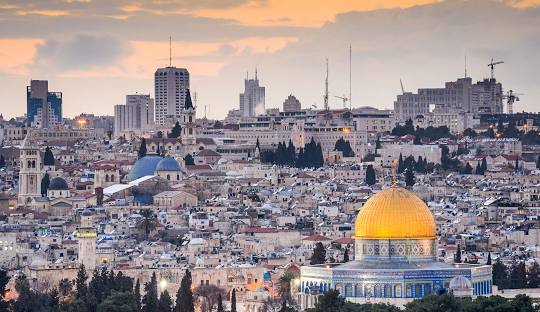Jerusalem, Israel
🕍 Jerusalem, Israel: A Timeless Mosaic of Faith, History & Culture
Jerusalem is a city like no other—a spiritual, historical, and cultural epicenter that stirs the soul. Sacred to Jews, Christians, and Muslims, it is a living museum of civilization layered with 5,000 years of history. From ancient stone streets in the Old City to modern galleries and cafes in West Jerusalem, this city offers both profound depth and vivid energy. Whether you're a pilgrim, historian, or curious traveler, Jerusalem leaves an indelible mark on the heart.
🕌 Old City Wonders: The Spiritual Heart of the World
✡️ Western Wall (Kotel)
A revered site in Judaism, the Western Wall is what remains of the Second Temple. Thousands come daily to pray, placing written prayers in the ancient stones.
✝️ Church of the Holy Sepulchre
Regarded by many Christians as the site of Jesus’ crucifixion, burial, and resurrection. Pilgrims follow the Via Dolorosa, the path believed to be walked by Christ on the way to his crucifixion.
🕌 Al-Aqsa Mosque & Dome of the Rock
Islam’s third holiest site, located on Haram al-Sharif / Temple Mount. The golden Dome of the Rock is one of Jerusalem’s most iconic silhouettes.
🛡️ The Four Quarters
The Old City is divided into Jewish, Christian, Muslim, and Armenian Quarters, each with its own unique atmosphere, cuisine, and landmarks.
🖼️ Beyond the Walls: Modern Jerusalem & Cultural Touches
🏛️ Yad Vashem
Israel’s official Holocaust memorial and museum. It’s both a powerful and sobering experience, honoring the memory of six million Jews.
🧠 Israel Museum
Home to the Dead Sea Scrolls, stunning archaeological collections, and Jewish artifacts spanning centuries.
🚊 Mamilla Mall & Ben Yehuda Street
These modern hubs blend upscale boutiques and street performers with lively pedestrian zones and open-air cafes.
🌄 Scenic Views & Nature Retreats
🏞️ Mount of Olives
Offers one of the most breathtaking panoramic views of the city. It’s also a sacred Jewish burial site and features Christian pilgrimage stops like the Church of All Nations.
🌿 Ein Kerem
A charming hillside village and the legendary birthplace of John the Baptist. Known for its art galleries, monasteries, and cafés.
🌳 Jerusalem Forest
A peaceful retreat on the city’s western edge, great for hikes and scenic views.
🧆 Local Flavors: A Cultural Melting Pot of Taste
Jerusalem’s food is as layered as its history.
-
Hummus & Falafel – Street staples found everywhere.
-
Shakshuka – Spiced tomato and egg dish, perfect for breakfast or brunch.
-
Jerusalem Mixed Grill (Meorav Yerushalmi) – A grilled meat specialty served with tahini or amba.
-
Jachnun, Kubbeh, and Sabich – Middle Eastern, Yemenite, Kurdish, and Iraqi Jewish specialties reflecting the city’s diversity.
Don't miss Machane Yehuda Market—a colorful fusion of flavors, spices, produce, wine bars, and restaurants.
🏨 Where to Stay in Jerusalem
-
Luxury: The King David Hotel – Classic grandeur overlooking the Old City.
-
Mid-range: Hotel Yehuda – Nestled near the Jerusalem Forest with modern amenities.
-
Boutique: Villa Brown Jerusalem – Stylish and intimate, ideal for romantic stays.
-
Budget: Abraham Hostel – Social, comfortable, and centrally located.
💡 Travel Tips
-
Best Time to Visit: Spring (April–May) and Fall (September–November) for mild weather.
-
Dress Modestly: Especially when entering religious sites in the Old City.
-
Languages: Hebrew and Arabic are official; English is widely spoken in tourist areas.
-
Shabbat: From Friday sunset to Saturday evening, much of the city slows down; plan accordingly.


